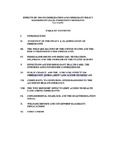Effects of 1996 on Immigration and Immigrant Policy Reforms on Legal Permanent Residents

View/
Author
Hoeffel, Katherine K.
Subject
Washington and Lee University, Shepherd Poverty Program
Personal Responsibility and Work Opportunity Reconciliation Act of 1996 (United States)
Poverty
Immigrants
Illegal Immigration Reform and Immigrant Responsibility Act of 1996 (United States)
Immigrants -- Government policy
Health care reform
Public welfare
Metadata
Show full item recordDescription
Katherine K. Hoeffel is a member of the Class of 2004 of Washington and Lee University. Capstone; [FULL-TEXT FREELY AVAILABLE ONLINE] Essentially, PRWORA [Personal Responsibility and Work Opportunity Reconciliation Act] promised to decrease welfare spending by $55 billion over five years, limit welfare receipt to two years after which time recipients must work, establish a lifetime limit of five years on welfare, and allocate a lump-sum payment (block grant) to states to create state-based welfare programs. . . . While the Federal government continued to exercise its control over immigration policy, it passed onto State governments the responsibility of immigrant policy and shifted the expense of services that supported immigrant integration into society. This paper investigates how the policies, as perceived and modified in the 1996 welfare reform action, affected health care access and related issues of the next generation of immigrants to America. [From Introduction] KatherineHoeffel